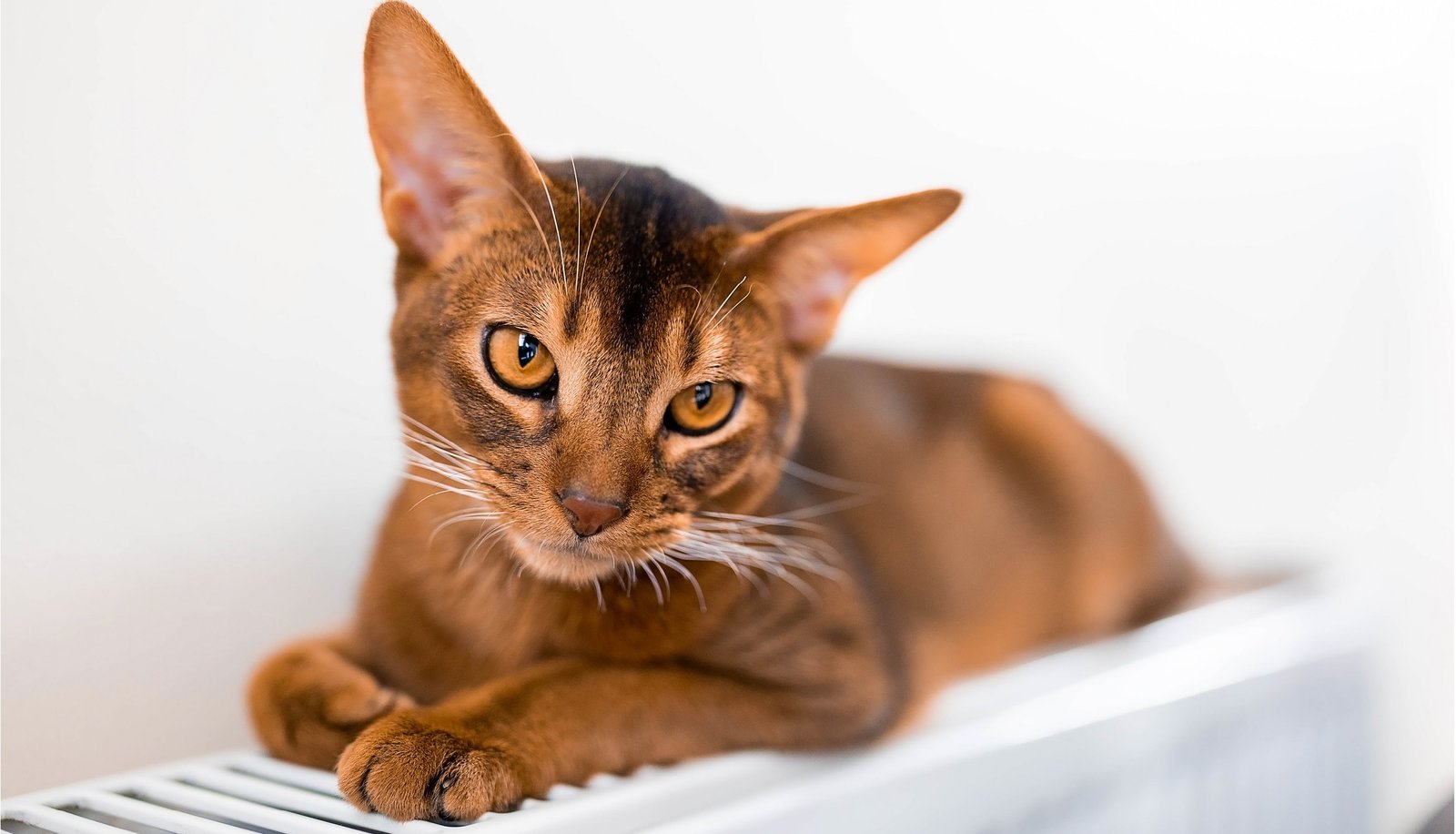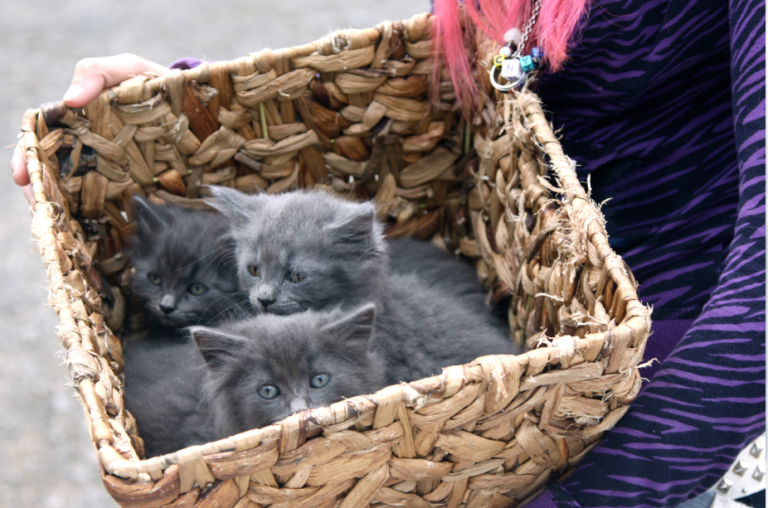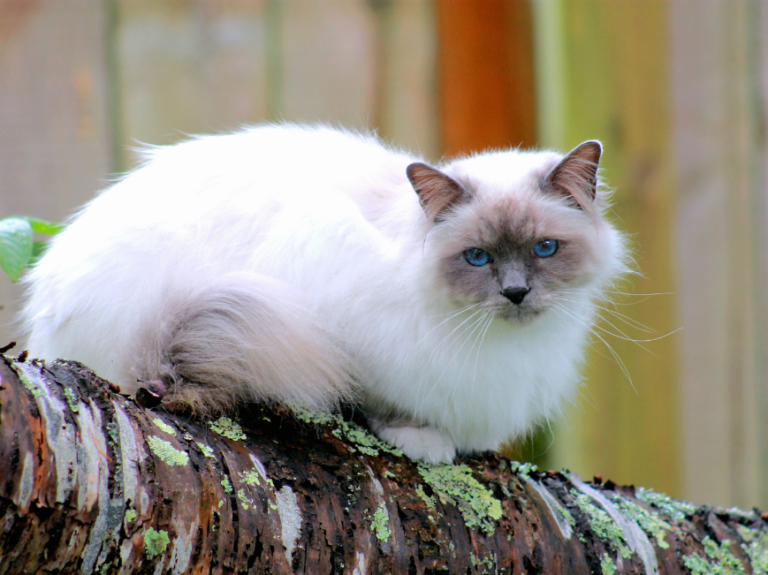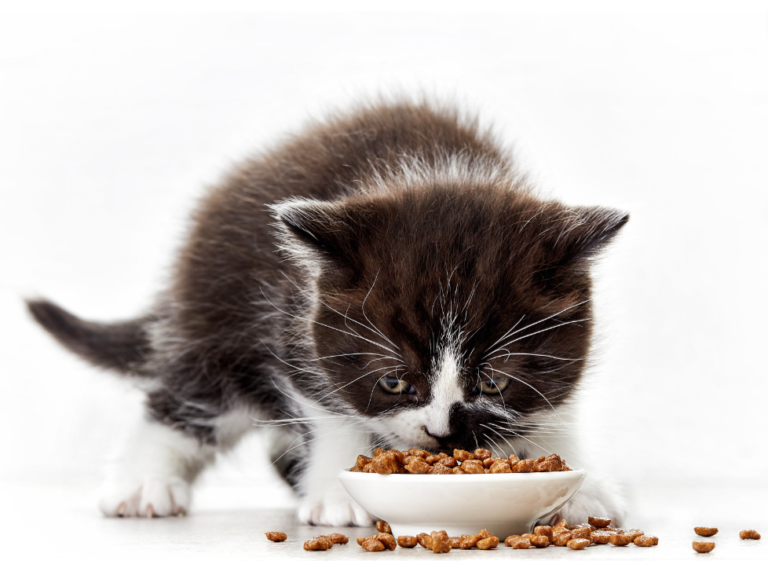History and Origin of Abyssinian Cats
The origins of the Abyssinian cat breed are shrouded in mystery and intrigue, dating back thousands of years. These cats have a rich and storied past, with many theories about their beginnings.
Ancient Beginnings
Many believe that Abyssinian cats have a lineage tracing back to ancient Egypt, where they were revered and even worshipped. Artistic depictions from ancient Egypt often show cats with a striking resemblance to the modern Abyssinian. These cats were likely prized for their hunting skills and companionship, becoming symbols of grace and poise.
Modern Development
The modern development of the Abyssinian breed began in the late 19th century, with the first documented Abyssinian appearing in British cat shows. A cat named Zula, imported from Abyssinia (now Ethiopia), is often credited with establishing the breed in Europe. From there, breeders worked to refine the Abyssinian’s distinctive features and temperament, leading to the elegant and lively cats we know today.
Physical Characteristics
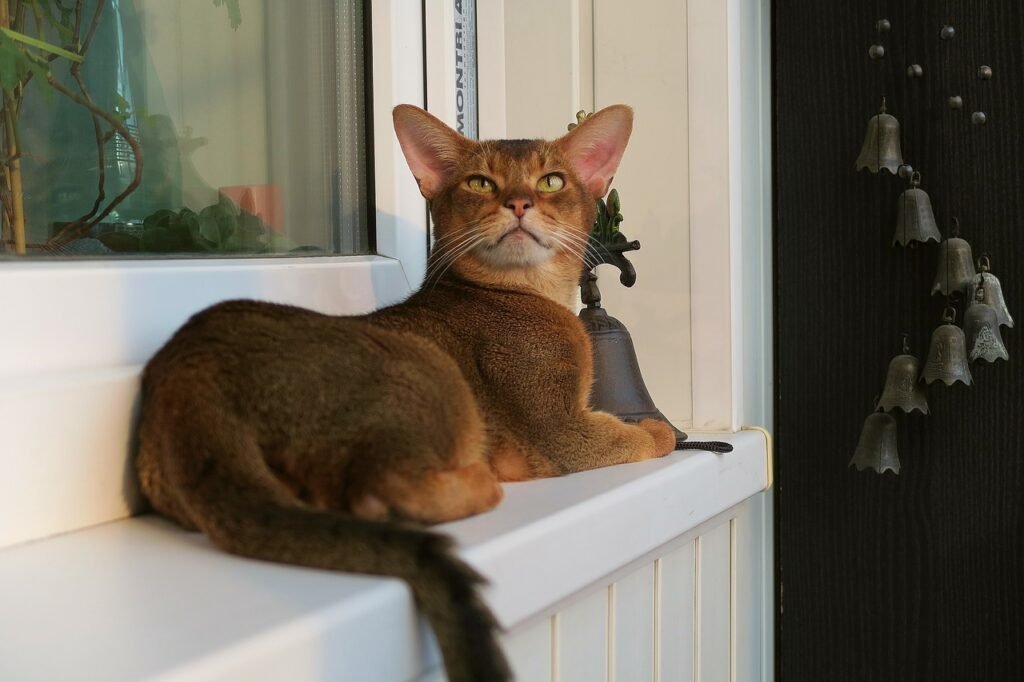
The Abyssinian cat is easily recognizable due to its distinctive coat and athletic build. Their appearance is both exotic and captivating, making them stand out in any setting.
Coat and Coloration
The most defining feature of the Abyssinian cat is its ticked coat, which gives it a unique, wild appearance. Each hair is banded with multiple colors, typically a warm reddish-brown base with black or dark brown ticking. This gives the coat a beautiful, shimmering effect. Abyssinians also come in other colors such as blue, fawn, and cinnamon, all showcasing the same stunning ticked pattern.
Size and Build
Abyssinians are medium-sized cats, known for their muscular and agile bodies. They have a graceful yet robust build, with long, slender legs and a distinctive arch on their back. Their large, almond-shaped eyes and expressive ears add to their alert and inquisitive look, reflecting their active and curious nature.
Personality and Temperament
Abyssinians are known for their lively and curious nature, making them a favorite among cat enthusiasts. Their dynamic personalities are a key part of their charm, providing endless entertainment and companionship.
Playfulness and Activity Level
One of the most endearing traits of Abyssinian cats is their high energy and playful demeanor. They are always on the move, exploring their surroundings and engaging in interactive play. Abyssinians love to climb, jump, and chase, requiring plenty of physical and mental stimulation. Providing toys, climbing structures, and interactive games will keep them happy and healthy.
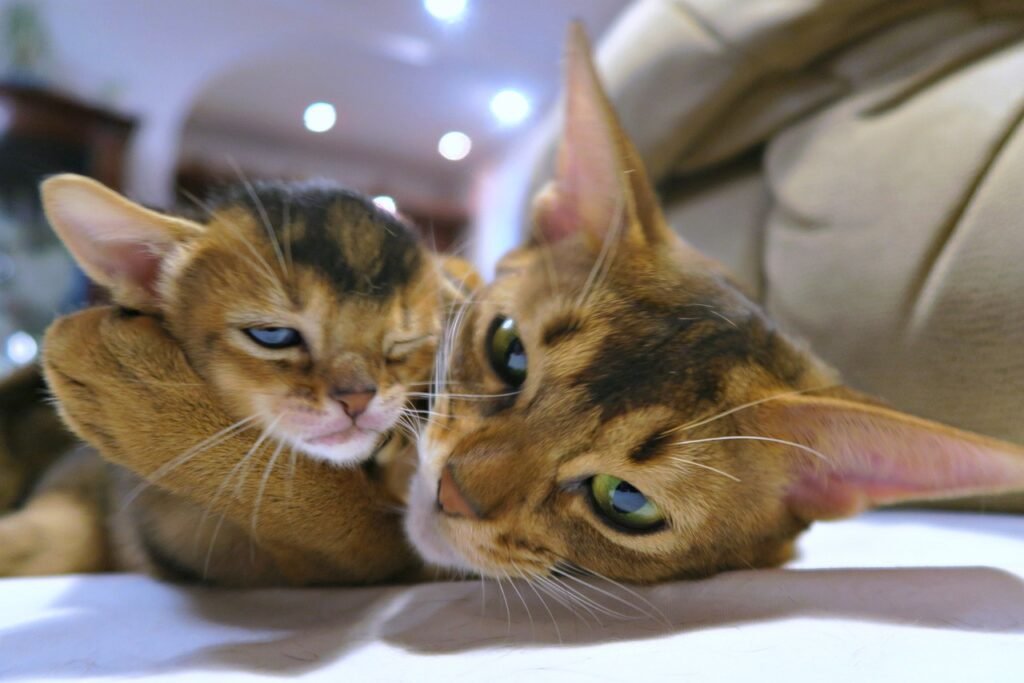
Social Behavior
Abyssinians are incredibly social cats, often forming strong bonds with their human companions. They thrive on interaction and enjoy being involved in family activities. These cats are known to be affectionate without being overly clingy, striking a perfect balance for many cat owners. Their social nature also means they do well in households with other pets, as long as introductions are managed carefully.
Care and Maintenance
Caring for an Abyssinian cat requires some specific considerations to ensure they remain healthy and happy. Understanding their needs will help you provide the best care for your feline friend.
Grooming Needs
Despite their luxurious appearance, Abyssinians have relatively low grooming needs due to their short coats. Regular brushing once or twice a week is usually sufficient to keep their coat in good condition and reduce shedding. This also provides an opportunity to check for any skin issues or parasites.
Diet and Nutrition
A well-balanced diet is crucial for maintaining the health and vitality of an Abyssinian cat. Their diet needs to be carefully considered to ensure they receive all the essential nutrients required for their active lifestyle and overall well-being.
Essential Nutrients
Abyssinian cats, like all cats, are obligate carnivores, meaning their diet must be primarily composed of meat. Essential nutrients include:
- Protein: The primary source of energy for Abyssinians. High-quality animal proteins such as chicken, turkey, and fish are ideal.
- Fats: Necessary for maintaining a healthy coat and skin, as well as providing energy. Omega-3 and Omega-6 fatty acids are particularly beneficial.
- Vitamins and Minerals: Vitamins like A, B, D, E, and minerals such as calcium, phosphorus, and taurine are essential for various bodily functions, including vision, bone health, and cardiovascular health.
- Water: Fresh water should always be available. Hydration is vital for kidney health and overall bodily functions.
Types of Cat Food
When it comes to feeding your Abyssinian, there are various types of commercial cat foods available, each with its pros and cons:
- Dry Food (Kibble): Convenient and long-lasting, dry food is a popular choice. However, it can sometimes lack moisture, so it’s important to ensure your cat drinks plenty of water if fed primarily kibble.
- Wet Food (Canned): Higher in moisture content, which is beneficial for hydration and can help prevent urinary tract issues. Wet food often has a more appealing taste and smell, which can be advantageous for picky eaters.
- Raw Diet: Some owners opt for a raw food diet, which can include raw meat, organs, and bones. This diet can be beneficial if carefully balanced but requires meticulous planning to avoid nutritional deficiencies and bacterial contamination.
- Homemade Diet: A homemade diet can be tailored to meet your cat’s specific needs, but it requires careful formulation to ensure it’s nutritionally complete. Consulting with a veterinarian or a pet nutritionist is recommended if you choose this route.
Feeding Schedule
A consistent feeding schedule helps maintain your cat’s digestive health and energy levels. Most adult Abyssinians do well with two meals per day, though some cats may prefer smaller, more frequent meals.
- Kittens: Kittens require more frequent feeding, usually three to four times a day, due to their higher energy needs and rapid growth.
- Adults: Two meals a day, one in the morning and one in the evening, typically suffice for adult cats.
- Seniors: Older cats may benefit from more frequent, smaller meals to aid digestion and prevent obesity.
Special Dietary Considerations
Abyssinian cats, like all breeds, can have specific dietary needs based on their health and lifestyle:
- Weight Management: If your Abyssinian is overweight, consider a diet with controlled calorie content and increased fiber to promote satiety.
- Allergies: Food allergies are relatively rare in cats but can occur. Common allergens include beef, dairy, and fish. An elimination diet can help identify and manage allergies.
- Health Conditions: Cats with specific health conditions, such as kidney disease or diabetes, may require special diets prescribed by a veterinarian to manage their condition effectively.
Treats and Supplements
Treats can be a wonderful way to bond with your cat and reward good behavior, but they should be given in moderation to avoid overfeeding.
- Healthy Treats: Opt for treats that are low in calories and high in protein. Freeze-dried meat treats are often a good choice.
- Supplements: Some Abyssinians may benefit from supplements such as fish oil for a healthy coat or joint supplements if they have arthritis. Always consult with your veterinarian before adding supplements to your cat’s diet.
Monitoring and Adjusting the Diet
Regular monitoring of your Abyssinian’s weight, coat condition, and overall health is essential. Adjust their diet as needed based on life stages, activity levels, and health status. Regular veterinary check-ups can help identify any nutritional deficiencies or health issues early on, allowing for timely adjustments to their diet.
In conclusion, providing a well-balanced, nutritious diet tailored to your Abyssinian cat’s needs will help ensure they lead a healthy, active, and happy life. By paying attention to their nutritional requirements and making informed choices, you can support your feline friend’s overall well-being and longevity.
Health
Abyssinian cats are generally healthy, but they are predisposed to certain genetic conditions. Awareness of these issues and regular veterinary care can help ensure a long and healthy life for your cat.
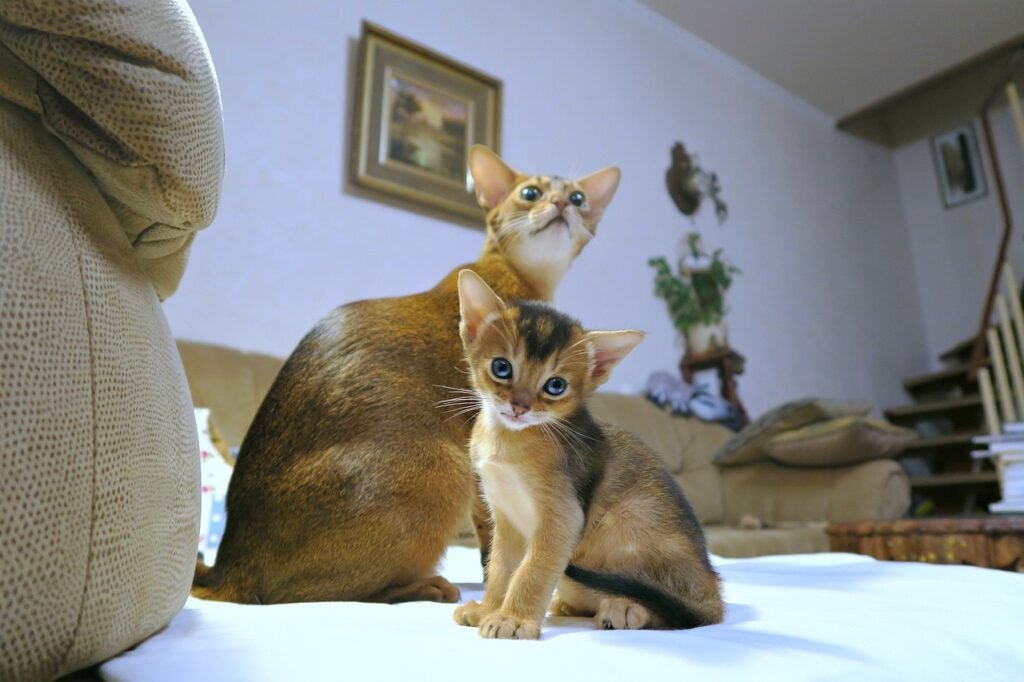
Common Health Issues
Some of the common health issues that may affect Abyssinian cats include dental problems and kidney disease. They are also prone to hereditary conditions such as Pyruvate Kinase Deficiency (PKD) and Progressive Retinal Atrophy (PRA). Regular check-ups and early detection are key to managing these health concerns effectively.
Preventative Care
Regular veterinary check-ups and preventative care are essential for catching potential health issues early. By staying proactive about your Abyssinian cat’s health, you can ensure they lead a long, happy life.
Regular Veterinary Check-Ups
Routine veterinary visits are the cornerstone of preventative care. These check-ups typically occur annually, but more frequent visits may be necessary for older cats or those with specific health concerns. During these visits, the veterinarian will perform a thorough physical examination, checking for any signs of illness or abnormalities. They will also update vaccinations, discuss diet and nutrition, and address any questions or concerns you may have about your cat’s health.
Vaccinations
Vaccinations play a crucial role in protecting your Abyssinian cat from common infectious diseases. Core vaccines, such as those for feline distemper (panleukopenia), feline herpesvirus, calicivirus, and rabies, are recommended for all cats. Non-core vaccines, such as those for feline leukemia virus (FeLV), may be advised based on your cat’s lifestyle and risk factors. Keeping your cat’s vaccinations up to date helps prevent serious illnesses and contributes to overall public health.
Dental Care
Dental health is an often overlooked aspect of cat care, but it is vital for their overall well-being. Abyssinians are prone to dental issues, including periodontal disease and tooth decay. Regular dental check-ups and cleanings by a veterinarian are essential. At home, you can help maintain your cat’s dental health by brushing their teeth with a cat-specific toothbrush and toothpaste, providing dental treats or toys, and feeding them a diet that promotes oral health.
Parasite Prevention
Parasites such as fleas, ticks, and worms can cause significant health problems for your Abyssinian cat. Regular use of preventative treatments, such as topical or oral medications, can help keep these parasites at bay. Your veterinarian can recommend the best products based on your cat’s needs and environment. Additionally, regular fecal exams can help detect and treat internal parasites like roundworms, hookworms, and tapeworms.
Spaying or Neutering
Spaying (for females) or neutering (for males) your Abyssinian cat is an important part of preventative care. These procedures help prevent unwanted litters, reduce the risk of certain cancers, and improve behavioral issues related to mating instincts, such as marking territory or aggressive behavior. Discussing the timing and benefits of spaying or neutering with your veterinarian can help you make the best decision for your cat.
Weight Management
Maintaining a healthy weight is crucial for preventing numerous health issues, including diabetes, arthritis, and heart disease. Abyssinians are naturally active, but monitoring their diet and ensuring they get regular exercise is important. Avoid overfeeding and provide a balanced diet rich in protein. Regular weigh-ins during veterinary visits can help track your cat’s weight and adjust their diet and activity levels as needed.
Monitoring Behavior and Physical Condition
Keeping a close eye on your Abyssinian’s behavior and physical condition can help detect early signs of illness. Changes in appetite, litter box habits, grooming, or activity levels can indicate underlying health issues. Regularly checking your cat’s ears, eyes, skin, and coat for abnormalities can also help catch problems early. Promptly addressing any changes with your veterinarian ensures timely diagnosis and treatment.
By prioritizing preventative care, you can help your Abyssinian cat live a healthier, happier life. Regular veterinary visits, vaccinations, dental care, parasite prevention, spaying or neutering, weight management, and attentive monitoring all contribute to their overall well-being, allowing them to thrive as a cherished member of your family.
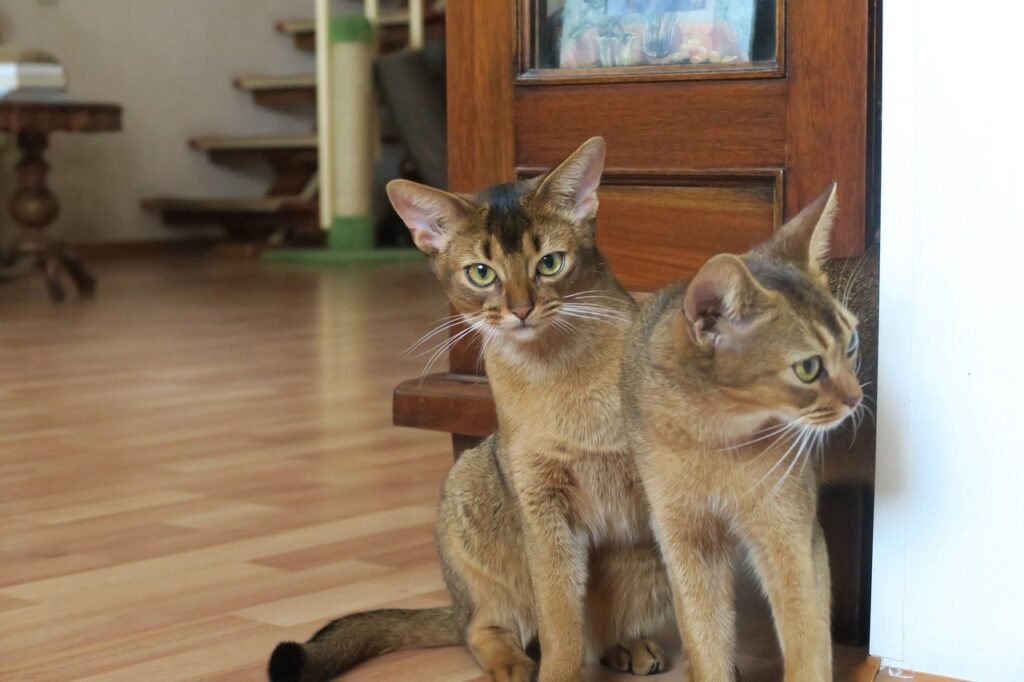
Training and Behavior
Training an Abyssinian cat can be a rewarding experience, thanks to their intelligence and eagerness to interact. Their natural curiosity and playful nature make them quick learners.
Litter Training
Abyssinians are typically quick to learn litter training, making them easy to housebreak. Providing a clean and accessible litter box is essential. Positive reinforcement, such as treats and praise, can help reinforce good behavior.
Interactive Play
Incorporating interactive play into an Abyssinian’s daily routine helps keep them mentally stimulated and physically active. Puzzle toys, feather wands, and laser pointers are great tools for engaging their hunting instincts and providing exercise. Regular play sessions also strengthen the bond between you and your cat.
Breeding and Genetics
Breeding Abyssinian cats requires a thorough understanding of their genetics to ensure the health and integrity of the breed. Responsible breeding practices help maintain the breed’s unique characteristics and prevent genetic disorders.
Breeding Standards
Adhering to established breeding standards is essential for maintaining the distinct characteristics of the Abyssinian breed. These standards cover aspects such as coat color, body structure, and temperament. Breeders must ensure that their cats meet these criteria to preserve the breed’s quality.
Genetic Testing
Genetic testing plays a crucial role in identifying potential hereditary issues and promoting responsible breeding practices. Tests for conditions like PKD and PRA can help breeders select healthy cats for their breeding programs, reducing the risk of passing on genetic disorders to future generations.
Abyssinian Cats in Popular Culture
The Abyssinian cat has left its mark not only in households but also in popular culture and media. Their striking appearance and engaging personalities have made them favorites in various forms of entertainment.
Famous Abyssinians
Over the years, several Abyssinian cats have gained fame through their appearances in movies, books, and even advertisements. These cats often portray intelligence, agility, and elegance, qualities that the Abyssinian breed embodies. Their presence in popular culture has helped increase awareness and appreciation of this unique breed.
Cherishing Your Abyssinian Cat
The Abyssinian cat is a remarkable breed that continues to captivate cat lovers around the world with its beauty, intelligence, and spirited personality. Whether you are a long-time fan or new to the breed, understanding their history, characteristics, and care needs will help you provide the best possible life for your feline companion. Cherishing the moments with your Abyssinian cat involves more than just meeting their basic needs; it means creating a loving and enriching environment where they can thrive.
Building a Strong Bond
Forming a strong bond with your Abyssinian cat is essential for their well-being and happiness. These cats are highly social and affectionate, often seeking out the company of their human companions. Spend quality time with your Abyssinian, engaging in interactive play sessions and offering gentle affection. Regularly talking to your cat and including them in family activities will strengthen your relationship and ensure they feel valued and loved.
Providing Mental Stimulation
Abyssinians are intelligent and curious cats that thrive on mental stimulation. Providing a variety of toys, puzzles, and activities can help keep their minds sharp and prevent boredom. Rotate their toys regularly to maintain their interest and introduce new challenges. Puzzle feeders and treat-dispensing toys can also provide mental enrichment while satisfying their natural hunting instincts.
Creating an Enriching Environment
An enriching environment is crucial for the physical and mental health of an Abyssinian cat. Ensure your home has plenty of vertical space, such as cat trees and shelves, to satisfy their love for climbing and exploring. Safe outdoor enclosures or window perches can offer a taste of the outside world without exposing them to potential dangers. Additionally, interactive play sessions with feather wands, laser pointers, and other toys can help channel their energy and provide exercise.
Social Interaction and Companionship
Abyssinians are known for their social nature and often enjoy the company of other pets, provided proper introductions are made. If you have other animals, gradual and supervised introductions can help ensure a harmonious relationship. In multi-pet households, Abyssinians often become the life of the party, engaging and entertaining both human and animal companions. Their friendly and outgoing personality makes them a joy to have around, fostering a lively and interactive home environment.
Health and Wellness
Maintaining your Abyssinian cat’s health is paramount to cherishing their presence in your life. Regular veterinary check-ups, vaccinations, and preventative care are essential for early detection and management of potential health issues. Monitoring their diet and ensuring they receive proper nutrition will contribute to their overall well-being. Additionally, providing a stress-free environment with plenty of opportunities for relaxation and play will help keep them healthy and happy.
Celebrating Their Unique Personality
Each Abyssinian cat has a unique personality that deserves to be celebrated. Pay attention to their individual preferences and quirks, whether it’s a favorite toy, a preferred napping spot, or a particular type of interaction. Respecting their boundaries and catering to their likes and dislikes will help create a trusting and loving relationship. Celebrate their milestones, whether it’s a birthday, a new trick, or simply another year of companionship.
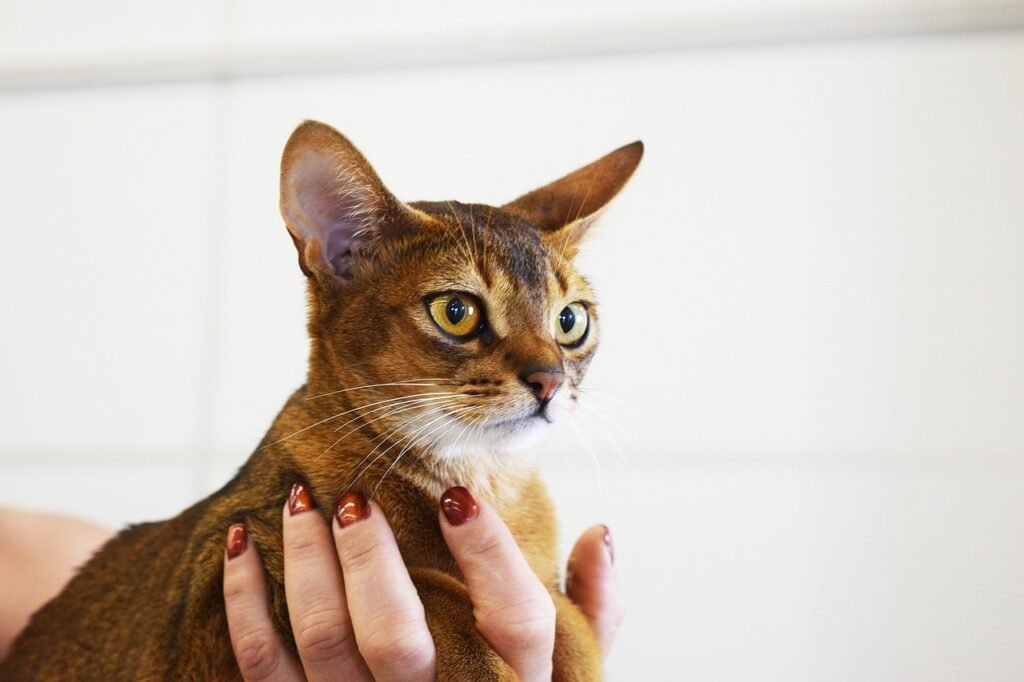
Educating Yourself and Others
Cherishing your Abyssinian cat also involves educating yourself and others about the breed. Understanding their history, characteristics, and care needs will help you provide the best possible life for your cat. Sharing this knowledge with friends, family, and fellow cat enthusiasts can help promote responsible pet ownership and appreciation for the breed. Participating in breed-specific clubs, forums, and events can also provide valuable insights and support from other Abyssinian cat owners.
In summary, cherishing your Abyssinian cat means embracing their lively and affectionate nature, providing a stimulating and enriching environment, and prioritizing their health and well-being. By building a strong bond, offering mental stimulation, creating a safe and engaging space, and celebrating their unique personality, you can ensure a fulfilling and joyful life for both you and your Abyssinian cat.
Frequently Asked Questions (FAQ)
Are Abyssinian cats good with children?
Yes, Abyssinian cats are generally good with children. Their playful and social nature makes them great companions for kids. However, it’s important to supervise interactions to ensure both the cat and the children are safe and comfortable.
Do Abyssinian cats require a lot of exercise?
Abyssinians are very active cats and require plenty of exercise. Providing toys, climbing structures, and engaging in interactive play will help meet their physical and mental stimulation needs.
How often should I groom my Abyssinian cat?
Abyssinians have short coats that require minimal grooming. Brushing once or twice a week is usually sufficient to keep their coat in good condition and reduce shedding.
What is the average lifespan of an Abyssinian cat?
The average lifespan of an Abyssinian cat is typically between 12 to 15 years, though some can live longer with proper care and a healthy lifestyle.
Are Abyssinian cats prone to any specific health issues?
While generally healthy, Abyssinian cats can be prone to certain genetic conditions such as Pyruvate Kinase Deficiency (PKD) and Progressive Retinal Atrophy (PRA). Regular veterinary check-ups and genetic testing can help manage these risks.

